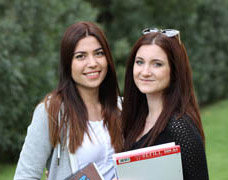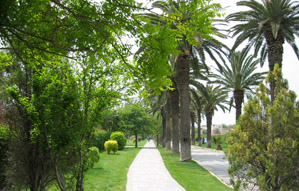Research

Research
The final EU-CONEXUS goal is to become the global leader in higher education and research in the area of smart urban coastal sustainability, with a perspective of expansion beyond the size of its founding consortium.
The partner institutions of the European University will create a cross-disciplinary, multi-disciplinary and cross‐sectorial teaching and research programme in close relationship with their socio‐economic environment in order to respond to actual needs of relative industries, support the regional innovation and development and foster an entrepreneurial mindset of their students.
The new and transnationally integrated curricula combine state‐of the‐art pedagogical methods and project‐based research and innovation in cooperation with public, social and economic actors.
Four Joint Research Institutes (JRI)
1. Life Sciences and Biotechnology Institute, 2. Environmental Sciences and Biodiversity Institute, 3. Coastal Engineering Institute, 4. Social, Culture and Human Sciences Institute have been created to bring together researchers and students from the different partner institutions, around common fields of interest. Enhancing international cooperation in joint research activities, EU‐CONEXUS Joint Institutes and research teams represent a multicultural, multilingual and multidisciplinary environment for conducting excellent research and innovation projects.
Joint Research Protocols
In order to develop our Joint Research Area, EU-CONEXUS partners have started to harmonize their research protocols and processes. As a result, Multilingual Laboratory Manuals (MLMs) are being produced by EU-CONEXUS.
Each protocol is formatted according to aharmonized Laboratory Protocol Template. The Template is available in English and in 6 EU-Conexus languages.
Each Protocol/ JSOP is in English and in the native language of the laboratory of origin.
A common Multilingual Laboratory Manual (MLM) of General Laboratory Safety Procedures that contains general safety rules applied in EU-CONEXUS laboratories is published in English and in all EU-CONEXUS languages (FR, CR, GR, LT, RO, ES). A Laboratory Safety Consent Form is also available for Researchers and students that walk on JRIs.
Joint Research Projects
Joint Research Institutes will actively pursue the implementation of pilot Joint Research Projects in the framework of Joint Diploma, MSc and Ph.D. theses, funded projects as well as services provision to the industry (including vocational training).
In order to ensure the efficient transfer of knowledge and dissemination of the common research activities, Joint Research Institutes will organize joint academic events including seminars, conferences, etc, open to the general public.
Joint Research institute can apply, through the Joint Research Steering Committee, for funding from the EU‐CONEXUS common budget in order to develop cooperation projects to be submitted at calls for proposals (EU‐CONEXUS project development fund). These teams involve at least three of the EU‐CONEXUS partner institutions and undergraduate and/or postgraduate students and/or public, social and/or economic actors.
Finally, Joint Research Institutes, in close collaboration with the JRSC, will exploit all available possibilities for funding of common research projects.
Project Development Fund
EU-CONEXUS, the European University for Smart Urban Coastal Sustainability, addresses global and local challenges by tackling coastal environmental, technical, economic and societal needs.
The EU-CONEXUS Joint Research Area brings together researchers and students from the different partner institutions around common fields of interest: Life Sciences and Biotechnology; Environmental Sciences and Biodiversity; Coastal Engineering; Social, Culture and Human Sciences.
One of EU-CONEXUS willingness is to support the implementation of joint research projects in the framework of funded collaborative projects by creating a Project Development Fund.
For this Project Development Fund, researchers from EU-CONEXUS partner universities can apply for funding in order to develop collaborative research and innovation projects.
The Project Development Fund will increase the participation of EU-CONEXUS partners in research and innovation calls for proposals (such as Belmont Forum, H2020, ERA-NET…) with a European or international dimension. Applications can be sent any time as this call will be open until 31/08/2022
EU-CONEXUS partner universities launch their research staff mobility calls
In order to support the development of the EU-CONEXUS Joint Research Area, the six partner universities of EU-CONEXUS have launched a call for research staff mobility among the alliance.
Each University opens up the opportunity for its research staff (Researchers/Professors, PhD students, Post-doc researchers, technicians and administrative staff for research) to visit another partner or associated partner university, its research units/laboratories or to participate to a research conference in-situ. Projects are expected to be collaborative and involve visits to the research infrastructure/s and unit/s by one researcher of the host institution (identified in the application).
The objective is for researchers to collaborate together, to be trained on certain protocols and processes or impulse new joint research projects on the smart urban coastal sustainability topic.
The Universities will fund the mobility costs (travels, subsistence) under its own institutional rules.
Researchers with disabilities/special needs can request additional grant support.
For more information, please contact the mobility office of each university:
EU-CONEXUS Research Hours
In the framework of Research, EU-CONEXUS is organizing the Research Hours once per month as training sessions in submission of projects or a place to discuss a research topic that concerns research teams of the consortium. That will facilitate our collaboration, the researchers will start knowing each other and the submission of joint projects will become more efficient.


